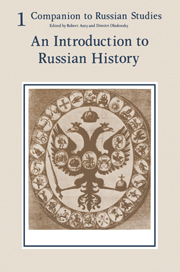Book contents
- Frontmatter
- Contents
- List of maps
- Preface
- Transliteration table
- Map 1 The USSR today
- Map 2 The northerliness of the Soviet Union
- 1 The Geographical Setting
- 2 Kievan Russia
- 3 Appanage and Muscovite Russia
- 4 Imperial Russia: Peter I to Nicholas I
- 5 Imperial Russia: Alexander II to the Revolution
- 6 Soviet Russia
- 7 The Church
- 8 The Structure of the Soviet State: Government and Politics
- 9 The Structure of the Soviet State: The Economy
- 10 The Soviet Union and its Neighbours
- Appendix
- Index
4 - Imperial Russia: Peter I to Nicholas I
Published online by Cambridge University Press: 09 January 2010
- Frontmatter
- Contents
- List of maps
- Preface
- Transliteration table
- Map 1 The USSR today
- Map 2 The northerliness of the Soviet Union
- 1 The Geographical Setting
- 2 Kievan Russia
- 3 Appanage and Muscovite Russia
- 4 Imperial Russia: Peter I to Nicholas I
- 5 Imperial Russia: Alexander II to the Revolution
- 6 Soviet Russia
- 7 The Church
- 8 The Structure of the Soviet State: Government and Politics
- 9 The Structure of the Soviet State: The Economy
- 10 The Soviet Union and its Neighbours
- Appendix
- Index
Summary
INTRODUCTION
The reign of Peter the Great (1682(9)–1725) not only opens the period covered in this chapter, but determines its character and confers on it unity (Map 17). Peter's reforms broke with the policies of the preceding Muscovite period, while in the reign of Nicholas I (1825–55) one can see the culmination and last stage of the basic trends that Peter had introduced. Rooted though they were in the preceding period, however, the reforms of the 1860s and 1870s opened a new period in Russian history characterized by a steadily increasing urbanization and industrialization. If Muscovy was the ‘Middle Ages’ for Russia, then the century and a half between the accession of Peter I and the death of Nicholas I may be compared to the transitional period of the sixteenth and seventeenth centuries in western Europe.
The reign of Peter I marks a sharp historical cleavage. It is perfectly true, of course, as many historians have pointed out, that his achievements in foreign policy crowned with success efforts initiated in the past, that the westernization of Russian life (of the upper classes at any rate) had begun to be felt in the reign of Tsar Alexis, and that even some of his institutional innovations derived from earlier practices. Yet Peter imparted to the transformation such a dynamic power that it changed its very tone and quality. Furthermore, his relentless drive for rapid westernization seemed like an irresistible force of nature, an impression confirmed by the ruthlessness with which he broke any opposition. His contemporaries, and the generations immediately following, felt that they were living in a time of revolutionary transformation and radical change.
- Type
- Chapter
- Information
- Companion to Russian StudiesAn Introduction to Russian History, pp. 121 - 195Publisher: Cambridge University PressPrint publication year: 1976



